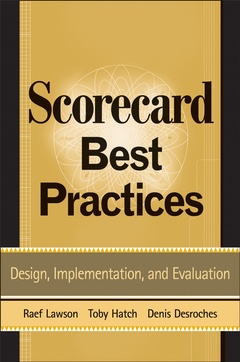Description
Scorecard best practices : design, implementation, and evaluation
Design, Implementation, and Evaluation
Authors: Lawson Raef, Desroches Denis, Hatch Toby
Language: English
Subject for Scorecard best practices : design, implementation, and...:
Keywords
best; management tool; information; current; colleagues; communicate changes; managers; strategy; tool; business units; changes; employee behavior; align; reference; order; goals; singlesource; benefit; case; performance; every; practical
Approximative price 49.14 €
Subject to availability at the publisher.
Add to cart224 p. · 16x23.6 cm · Hardback
Description
/li>Contents
/li>Biography
/li>
Raef Lawson, PhD, CPA, CMA, is Director of Research for the Institute of Management Accountants (IMA). He was formerly a professor and chair of the Accounting Department at the University at Albany, State University of New York. He has written extensively in the areas of scorecards, activity-based costing, and cost management, and his work has been published in a variety of publications.
Toby Hatch is a Domain Leader for Performance Scorecard and Business Modeling with Hyperion Solutions. Ms. Hatch has been involved with supporting and implementing scorecard systems, performance management solutions, and activity-based management solutions in companies around the world since 1988. Based on five years of research on implementing scorecard systems, she has published numerous articles in various magazines.
Denis Desroches is a Domain Leader in the business performance management field with Hyperion Solutions. Since 1993, he has supported organizations with the selection, implementation, and knowledge acquisition of scorecard, performance management, and activity-based management solutions.




